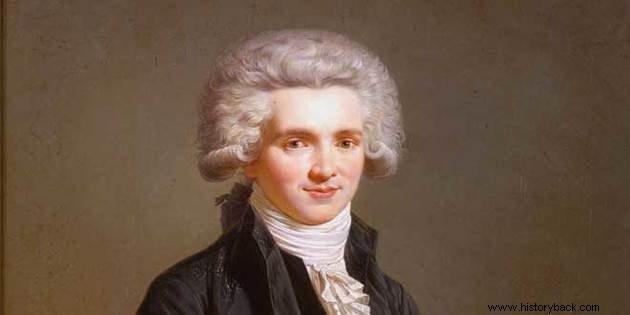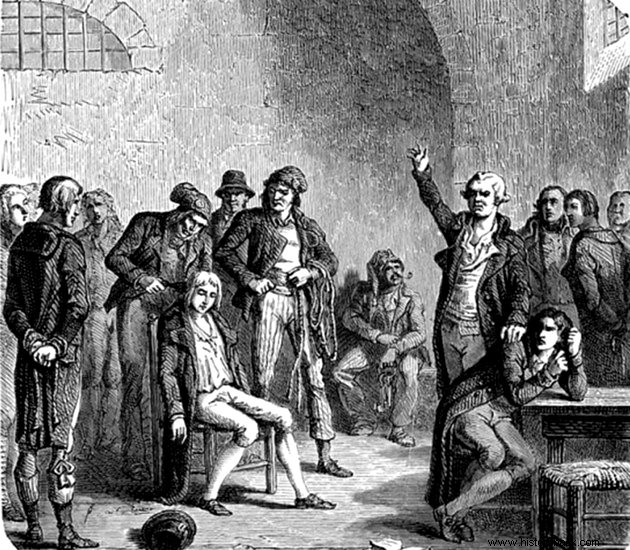Maximilien Robespierre , born 6 May 1758 and died 28 July 1794, was a French jurist and politician.
He distinguished himself as a leader of the Jacobins and presided over France during the most chaotic phase of the French Revolution, the Period of Terror.
Biography of Robespierre
Maximilien Robespierre was born in the city of Arras and was the eldest of five children. After the mother's death, the father turned the sons over to the maternal grandmother's care.
Described as intelligent, he chose a career in law, the same as his father and grandfather. He was a great admirer of Rousseau's philosophy, the American Constitution, the ideals of liberty and happiness.

As a writer, he stood out for defending the individual rights of Jews, Protestants, and actors. He was against the death penalty, slavery and advocated the vote for all men, regardless of their financial contribution.
In view of his success as a lawyer, he was elected deputy of the 3rd Estate for the Assembly of the Estates General. In this way, he attended the meetings when they were convened by King Louis XVI in May 1789.
From there, debates to save French finances take to the streets and events precipitate the Bastille.
In this context, Robespierre, with his oratory, would conquer the revolutionaries and be the leader of the Jacobin faction, considered the most radical. He would also find support among the sans-culottes , formed by traders and professionals. Because of his political positions, he would be in conflict with the Girondins, who joined the moderate currents.
Robespierre was a central figure in the French revolutionary process and his rigor led him to execute suspected anti-revolutionaries and earned him the nickname "Incorruptible".
However, he carried out important social changes such as the abolition of slavery in the colonies, the drafting of the French Constitution of 1793 or the establishment of the cult of the Supreme Being, with the aim of replacing the Catholic religion.
Ironically, Robespierre would meet the same fate as his enemies and die by guillotine on July 28, 1794.
See also:Storming of the Bastille (1789)Robespierre and the Period of Terror
After the Storming of the Bastille, revolutionaries thought it would be possible to establish a constitutional monarchy.
The scenario, however, changes with the attempt of King Louis XVI to escape to Austria. From there, hopes of transforming the monarchic regime end and several revolutionary factions want to establish the republic.
Likewise, several revolutionaries want to declare war on the Austrian Empire, but Robespierre is against it, as he believes it will be a long conflict. Likewise, he did not want to hand over all power to the military, for fear that they might strike a blow against the Jacobins.
The Girondins, for their part, are in favor of war, as they bet for a defeat and thus take power from the Jacobins. The conflict begins in April 1792 and France manages to stop the Austrians.
Without support and accused of having collaborated with the Austrians, the royal family is arrested and the French Republic is proclaimed on September 29, 1792.
Louis XVI is tried as a traitor and sentenced to death, being executed by guillotine in January 1793. His wife, Queen Marie Antoinette, would be killed in the same year. Robespierre signs the sentence and comments that "the king must die so that the country could live" .
Committee of Public Safety
Tempers are increasingly heated, because certain French provinces do not recognize the authority of the National Convention. To control tempers, Robespierre increasingly focuses his power on himself and uses intimidation and death sentences to control his opponents.
In this way, the Committee of Public Safety and the Revolutionary Tribunal are created by the members of the National Convention. The objective of these institutions was to help the members of the National Convention to implement measures defended by the Revolution such as social equality. The Committee also established public, universal and secular education and free hospitals.
However, the Committee eventually became a kind of supervisory body that judged those who were considered moderates or anti-revolutionaries.
It is estimated that the Committee sent 2639 people to the guillotine in Paris alone. Not by chance, this time will be known as the Period of Terror or Jacobin Terror.
See also:Terror in the French RevolutionRobespierre and Danton

One of the victims of Robespierre's persecution was his friend Georges Danton, a lawyer who lived in Paris and was the leader of the Cordeliers.
Danton was more flexible than Robespierre and managed to circulate among the various political groups in that troubled time. This gave him notoriety but brought him many enemies, as they accused him of taking bribes from royalist groups and of being "non-revolutionary".
Alongside Robespierre, he voted to condemn the king, helped create the Committees of Public Safety and the Revolutionary Tribunal. However, he did not oppose the war against Austria and this began to earn him Robespierre's distrust.
Thus, Robespierre ends up condemning him to death along with other revolutionaries, who are also considered traitors.
See also:French Revolution (1789)Death of Robespierre
The way Robespierre conducted politics displeased a large number of members of the National Convention.
In this way, the Girondins plot to remove him from power and for that, they accuse him of being a dictator and prevent him from speaking at the Convention.
Then they order that he and some collaborators, including Saint-Just, be arrested. When the soldiers go to carry out the order, some commit suicide by jumping out of the window or shooting themselves. Robespierre does too, but the shot hits his jaw.
Tried and sentenced quickly, he remains lying on account of the wound until the next day, when they take him to the guillotine, just as he had done with so many opponents.
From this moment, France is governed by the Directory and five years later, in 1799, the bourgeoisie will support the army in fear of foreign invasions. Then came the leadership and government of Napoleon Bonaparte.
See also:Coup of the 18th BrumaireQuotes by Robespierre
- "Terror is freedom's fight against its enemies."
- "If the revolution is wrong then the king is right, but if the revolution is right then the king is wrong."
- "The secret of liberty is to educate men, as the secret of tyranny is to keep them in ignorance."
- "If the existence of God, if the immortality of the soul were nothing but dreams, they would still be the most beautiful of all conceptions of the human spirit."
Also study about this subject:
- Enlightenment
- Jean-Jacques Rousseau
- American Constitution
- Questions about the French Revolution
